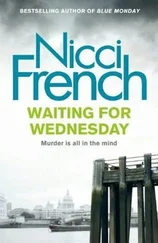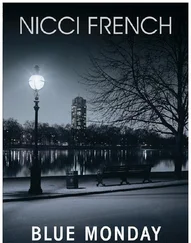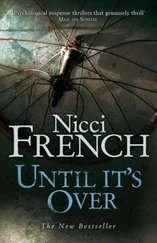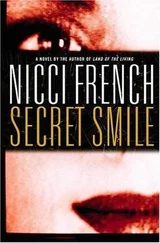‘I’m going home.’
‘Can I come along?’
‘Not this evening.’
‘All right. Can I say something to you?’
‘What is it?’
‘Not just on the street. Here – can we talk in here?’ Harry gestured towards the wasteland that Frieda looked at from her room every day. In the darkness, it seemed larger and wilder than it did when she stared down at it during the day. Weeds had sprung up; kids had made strange structures from the boards and metal sheets that the workmen had left when they’d abandoned the site. The remains of a bonfire lay near the gap in the fence where Harry stood, its embers still giving out a glowing pulse. He held back a loose part of the fence.
‘I don’t think so,’ said Frieda.
‘‘There’s a bench near here,’ said Harry, coaxingly. ‘I saw it when I walked past earlier. Just a minute, Frieda. Hear me out.’
Frieda hesitated, then stepped nimbly through the gap in the fence. Harry followed her and pulled it close.
‘Tell me.’
‘Let’s find this bench of mine.’
‘I don’t need to sit down.’
‘This way.’
They walked further into the enclosed space. There were craters in the earth; a small crane stood motionless in front of them.
‘Frieda,’ said Harry, in a murmur.
‘Yes?’
‘I’m sorry.’
‘Why?’
‘Because you see, my darling …’
He didn’t finish his sentence because a figure suddenly rose from the ground in front of them: an ancient man wrapped in a blanket, with a bottle in his hand and a strange rusty moan coming from his mouth.
‘He was asleep,’ said Frieda. Then, to the man: ‘I’m so sorry to have frightened you.’
He lifted the bottle to his mouth and tipped it so it was nearly vertical, drank.
‘We’re going,’ said Frieda. ‘It’s all right. We’ll leave you in peace.’
‘Lady,’ he said, and followed them as they made their way back to the fence, through the gap.
‘What was it you wanted to say sorry for?’ asked Frieda.
Harry stared at her. It seemed hard for him to speak. He looked around at the people bustling past, on the way from work, heading home or for a drink.
‘I wanted a word in private. I couldn’t come to your place, could I? Just for a moment.’
‘Not now.’
‘All right,’ he said at last. ‘It can wait.’
Michelle Doyce liked the hospital food. It was soft and greyish. It didn’t look like anything. There was something that tasted a bit like fish, with a thick grey sauce. But there were no bones, no shape. There was something that tasted a bit like chicken, also with a thick grey sauce, also with no bones and no shape. It never looked like it would move, like it would speak to her. She didn’t like the days. There were too many things all around her that felt like they were trying to batter at her head, colours and sounds and prickings on her skin, intertwining and tangling so that she couldn’t tell what was the colour and what was the sound. It was all just there, like a storm she was wandering around in, lost.
People came and went. Sometimes they moved so quickly and spoke so quickly that it was all a blur and she couldn’t make them out. It was as if she were standing on a station platform and they were on a train that wasn’t stopping, that was racing past at a hundred miles an hour. Sometimes they would try and say something but she couldn’t catch it. It had been the same with the other patients in the ward. She had seen them and heard them, like in the flashes of a strobe light, and they always seemed to be screaming, shouting in pain or anger or despair, and she felt their pain and anger and despair herself. It was like spending day after day surrounded by road drills and sirens and electric buzzers and flashing lights, with jagged stabbing knives in her eyes and her ears and her mouth. It was like a swarm of insects had got inside her body and were trying to scratch and chew their way out with their sharp jaws and claws. Every day she found things and hid them, then ordered them carefully. There were pieces of leftover soap from the bathroom, a little piece of silver wrapper from a pill container, a piece of sticking plaster, a screw. She arranged them in a pill box that had been left on the shelf by her bed. She would look at them and suddenly realize they were in the wrong order, take them out again and put them in the right order.
Mainly it was bad. She felt she had been put out on a rock in the middle of the sea where she was completely alone, too hot or too cold, too dry or too wet, and she could never sleep because if she slept she would be washed off and battered and swept away and lost.
But it had got better when she was moved into a room of her own, as if she had escaped into a little quiet hole, away from the drills and the flashing lights. There was a TV. She would sit there and at first the speckly light and the jagged sound would be a torment but it was also soothing, like something warm washing over her, and she would watch the moving shapes for hour after hour. There were magazines as well, bright, smiling faces looking at her, asking for her friendship and her approval. She could hear them talking to her and she would smile back and sometimes she would catch them talking about her and she would shut the magazine, trap them, teach them a lesson. And there was the nurse. Sometimes she was white, but with an accent; sometimes she was Asian; sometimes she was African. But she would lead her through a bright corridor, so bright that it dazzled her eyes, and sit her in a chair and lean her back and wash her hair. She could feel the fingers warm on her head. The feeling reminded Michelle Doyce of something long, long ago, deep down, when she was being held and kept safe. Then there were the two animals: the teddy bear and the dog. They sat on her bed; they slept with her. The dog had buttons for eyes. She knew they were only toys. But she had a feeling. She couldn’t stop the feeling. Like a child lying in bed with a heavy sleeping parent beside them. Not moving but warm and alive. They knew things; they were watching. When the noises and the lights got too much, she could look at them, feel them against her.
Best of all were when the lights went away and the noises sank like a storm blowing itself out. There would be a shout and a murmuring and a flickering and the lights would go out. It didn’t get dark straight away. The light stayed in Michelle Doyce’s eyes, like a dull ache, an after-light of sour green turning to dirty yellow, then back to green, gradually fading to brown and to black. The darkness felt warm. Now even the lights felt more friendly. They blinked outside, in through the window, from far away in the night. They blinked inside, lights on machines, red and green and yellow. Even the noises were friendly, beeps and meeps. Sometimes, far away outside her room, there were groan and moans and cries that reminded Michelle Doyce of all the pain, but the dark was like a big furry cloth that mopped up the messy noises and squeezed them out somewhere into a river that would carry them away. The day wasn’t for waking and the night for sleeping. It was all a sort of long doze and she wasn’t sure whether the pictures in her head and the voices were on TV or whether they were the people coming and going in the ward or whether they were stories she was telling herself, and what did it matter anyway?
But the nights were good. The lights became soft and the sounds softened, too, and the sharp edges of things became rounded. Michelle Doyce would have been happy for life to be like this always, and to go on for ever and ever, sleeping and waking, warm and safe.
Voices came out of the darkness. They were part of her dream. She had been walking in a street and then she had been back somewhere inside, somewhere that seemed familiar. She was making tea. She filled the kettle and prepared cups and saucers. A bear and a dog with button eyes were sitting at the table.
Читать дальше












